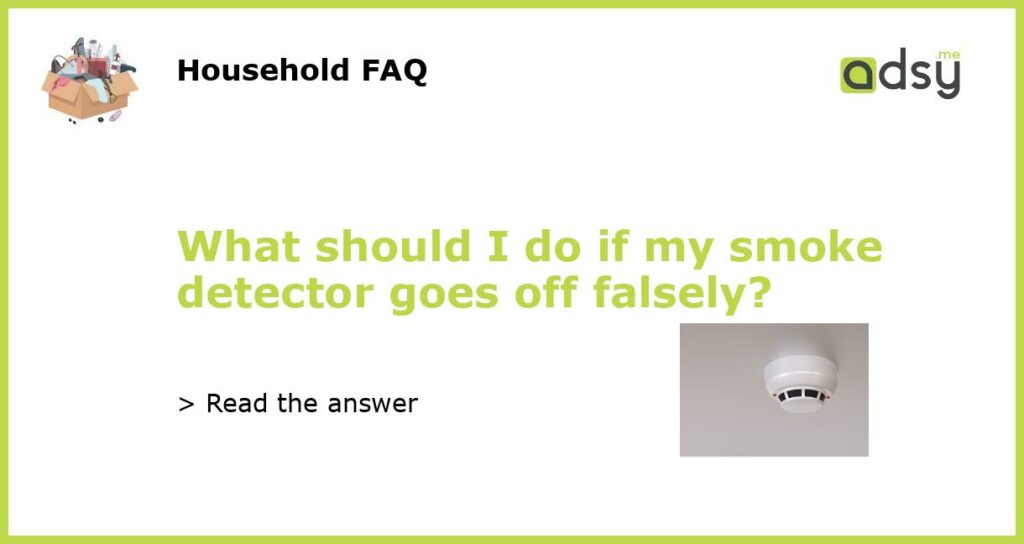Common Causes of False Smoke Detector Alarms
A smoke detector going off falsely can be a frustrating experience, and it is important to know how to handle the situation effectively. There are several common causes of false smoke detector alarms that you should be aware of.
One common cause is cooking smoke. If you have a smoke detector located near your kitchen, it may go off when you are cooking something on high heat or when there is a lot of smoke produced. Steam from a hot shower can also trigger a false alarm if there is a smoke detector located nearby.
Another common cause of false alarms is dust and dirt buildup. Over time, dust and dirt can accumulate in the sensors of your smoke detector, causing it to malfunction. This is especially common in older detectors that may not be as sensitive or have advanced technology to filter out false triggers.
Electrical issues can also lead to false alarms. If there is a problem with the wiring or power source of your smoke detector, it may go off when there is no smoke or fire present. This type of issue should be addressed by a professional electrician to ensure the safety and functionality of your smoke detector.
Steps to Take When Your Smoke Detector Goes Off Falsely
If your smoke detector goes off falsely, there are several steps you can take to address the situation.
The first step is to remain calm and assess the situation. Look for any signs of smoke or fire in your home. If you do not see any immediate danger, it is likely that the alarm is a false one.
Next, open windows and doors to let in fresh air. This can help to clear any lingering smoke or steam that may be triggering the alarm. If the false alarm is caused by cooking smoke or steam, this step may be enough to resolve the issue.
If the alarm continues to go off, locate the reset button on the smoke detector and press it. This should stop the alarm temporarily, but it is important to address the underlying issue to prevent future false alarms.
Preventing False Smoke Detector Alarms
To prevent false smoke detector alarms, there are several steps you can take on an ongoing basis.
Regularly clean your smoke detectors to remove any dust or dirt buildup. You can use a vacuum cleaner with a brush attachment to gently clean the sensors and remove any debris. Be sure to follow the manufacturer’s instructions for cleaning your specific model of smoke detector.
Be mindful of where you place your smoke detectors. Avoid placing them near areas that produce a lot of smoke or steam, such as the kitchen or bathroom. Instead, opt for locations that are more central to the home and away from potential sources of false triggers.
If you have pets, consider their movements and behaviors when placing smoke detectors. Avoid areas where pets may trigger false alarms, such as near their bedding or litter boxes.
Regularly test your smoke detectors to ensure they are functioning properly. This can help to identify any issues before they result in false alarms. Follow the manufacturer’s instructions for testing your specific model of smoke detector.
When to Replace Your Smoke Detector
If you experience frequent false alarms or notice other signs of malfunction, it may be time to replace your smoke detector.
Smoke detectors typically have a lifespan of 8-10 years, after which they may become less reliable. If your smoke detector is approaching or surpassing this timeframe, it is a good idea to replace it with a new one.
Similarly, if you have an older model of smoke detector that is not equipped with advanced technology to filter out false triggers, you may want to consider upgrading to a newer model that offers this feature.
When replacing your smoke detector, be sure to choose a reputable brand and model that meets safety standards. Install the new smoke detector according to the manufacturer’s instructions and test it regularly to ensure it is functioning properly.
Seek Professional Help if Needed
If you have tried the above steps and continue to experience frequent false smoke detector alarms, it may be necessary to seek professional help.
An electrician can inspect your smoke detectors and wiring to identify any issues and make necessary repairs or replacements. They can also ensure that your smoke detectors are properly installed and functioning correctly.
Additionally, a professional electrician can provide guidance on placement of smoke detectors and recommend the best models for your specific needs.
Remember, the safety of your home and family is of utmost importance. Taking the appropriate steps to address false smoke detector alarms will help to ensure that your detectors are reliable and effective in the event of a real emergency.






